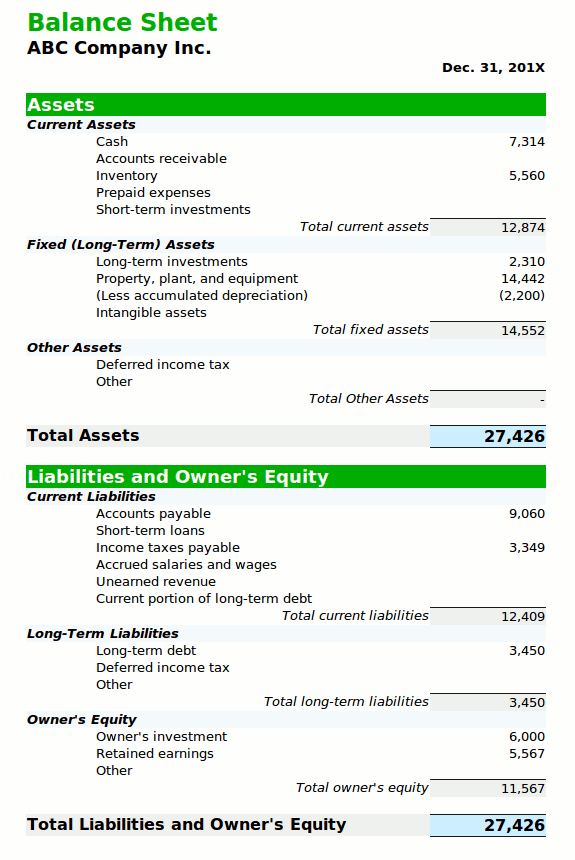DETERMINATION OF THE VIABILITY OF A BUSINESS
To determine whether or not a business is viable an investigation into the following sources of information must be made.
1. Trading, Profit and Loss Account.
2. Balance Sheet
3. Annual Reports of Limited companies.
4. Stock Exchange Report relating to quoted companies.
5. Financial Ratios prepared by accountants and investment analysts.
BALANCE SHEET
The Balance sheet of a firm is the summary or statement of the financial position of that firm at
a particular date, usually at the end of the financial year.
STRUCTURE OF THE BALANCE SHEET
The normal balance sheet shows the capital and liabilities on the left-hand side and the assets
on the right-hand side. An illustration is given below:

REVIEW QUESTIONS
1. List six examples of each of the following:
(a) Fixed Assets
(b) Current Assets
2. State two importance of the Balance Sheet as a financial statement.
USES OF FINANCIAL RATIO:
- Ratios are used in preparing industrial averages.
- They can be used to interpret financial statements.
- They help in comparing performances between and among related organizations.
- Ratios help to measure the ability of a given entity to meet its short-term obligations.
- They are used in evaluating the performance of companies in the same business
DISADVANTAGES OF USING RATIO
- Ratios can easily be affected by inflation
- They can be manipulated upon or abused
- Different accounting policies affect ratio calculation
TYPES OF RATIO
- Profitability and efficiency ratio
- Liquidity ratio
- Investment ratio
PROFITABILITY AND EFFICIENCY:
Profitability and efficiency ratios measure the effectiveness of the management as shown by the returns obtained on sales and capital invested. This can be broken down into the following.
- Net profit%
- Gross profit%
- Returns on capital employed
- Assets turnover ratio
- Individual expenses items to sales ratio e.g advertising carriage outwards etc

- LIQUIDITY RATIOS:
These ratios help in measuring the ability of an organization to meet its obligations as they fall due. Ratios under this heading are:
- Current ratio or working capital ratio
- Average stock
- Stock to net current assets
- Debtors ratio
- Creditors ratio


GEARING OR LEVERAGE: This shows the relationship between owners’ equity or capital and
debt financing of business assets. It shows the proportion of the assets being financed with
long-term debt.
Gearing Ratio or Leverage Ratio = Long term liabilities
Equity Capital
If the Gearing Ratio is above 40% (0.4) the business is said to be highly geared. If lower than
40% (0.4) the business is low geared.
REVIEW QUESTIONS
- State two uses of financial ratio.
- List four liquidity ratios that can be used to evaluate the viability of a business firm.
READING ASSIGNMENT
Essential Commerce for SSS by O.A Longe page 153-162.
WEEKEND ASSIGNMENT
1. If the turnover of a business is N16,000 and the cost of goods sold is N12,000. What is the percentage of gross profit on sales. (a) 70% (b) 40% (c) 33.3% (d) 25%
2. What are fixtures and fittings in a balance sheet. (a) liquid capital (b) working capital (c) fixed assets (d) current assets
3. The form of capital which is easily transferred into the form desired is known as ___
(a) working capital (b) liquid capital (c) circulating capital (d) capital employed
4. When a company uses more of loans than equity to finance its business the company is said to be
(a) bankrupt (b) solvent (c) highly geared (d) insolvent
5. Which of the following shows the financial position of a business on a given date____
(a) bank statement (b) journal (c) balance sheet (d) cash book
THEORY
1. State three uses of the balance sheet prepared by business firms.
2. List four uses of the Trading, Profit and Loss Account prepared by business firms.
GENERAL EVALUATION QUESTIONS
- Explain seven roles of transport to businessmen
- List ten sources of capital available to a public limited company
- Give seven reasons why consumers need protection
- State five effects of hire purchase on the buyer
- State eight reasons why a bank may dishonor a cheque
Read our disclaimer.
AD: Take Free online baptism course: Preachi.com 